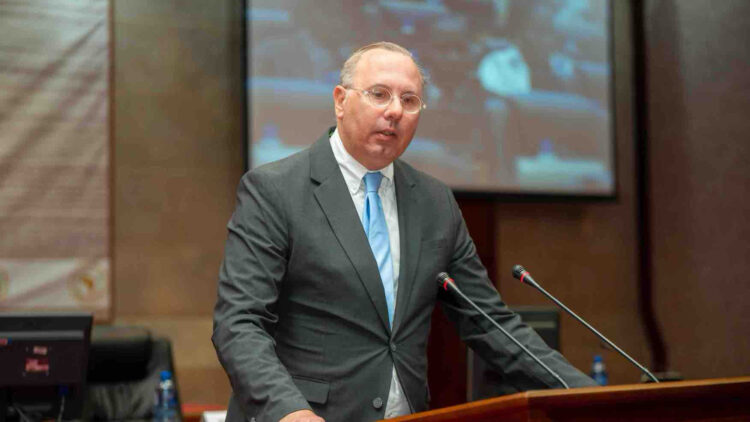By Byron Adonis Mutingwende
Oiriginally posted on spikedmedia.
MIDRAND, SOUTH AFRICA | 30 July 2025 (IDN) — The Pan-African Parliament (PAP) has taken a monumental step in tackling the urgent environmental and food security challenges facing the continent through the presentation and debate of the First Draft of the Model Law on Sustainable Soil Management in Africa. The session was co-led by Hon. Garry Sakata, Chairperson of the PAP Committee on Rural Economy, Agriculture, Natural Resources and Environment, and Prof. Oliver C. Ruppel, Director of the Development and Rule of Law Programme (DROP) at Stellenbosch University.
The draft law, the product of years of research and broad continental consultation, aims to offer a unified legal framework that African countries can adopt and adapt to sustainably manage and protect one of their most precious resources — soil.
A Legal Framework Rooted in African Realities
Prof. Ruppel highlighted the significance of the model law, which was developed with support from international partners including the UN Food and Agriculture Organization (FAO), UN Environment Programme (UNEP), and the African Soil Partnership. He emphasized that the model law is not a one-size-fits-all solution, but a flexible framework that recognizes Africa’s diversity of ecosystems, legal traditions, and socio-economic conditions.
“With these partners, we’ve developed not only the model law but also a comprehensive toolbox to help countries domesticate and implement sustainable soil governance.
“Without fertile, healthy soils, it is difficult to achieve food security or mitigate climate change. This model law is an African solution designed to address Africa’s soil degradation crisis,” said Prof. Ruppel.
A Legal Milestone for the Continent
The model law has been through multiple rounds of national and regional consultation, engaging parliaments, diplomats, agricultural stakeholders, and civil society. It includes nearly 40 detailed articles accompanied by commentaries and is rooted in the realities of diverse African jurisdictions.
Its objective is clear: to provide African nations with a framework to protect and sustainably manage their soil resources—resources that are vital not only to agriculture and food security but also to climate resilience and biodiversity.
“The continent’s soils are under immense pressure—from climate change, urban expansion, food insecurity, and poorly regulated land use. If left unchecked, this degradation threatens the very survival of millions,” Ruppel cautioned.
Bridging Legal and Scientific Gaps
Professor Ruppel underscored the lack of education and legislative support for farmers and extension officers when it comes to soil governance. The model law thus incorporates soil data and digital monitoring systems, which will strengthen implementation once national laws are in place.
The 800-page accompanying legal assessment, recently published and made freely available online, represents what Prof Ruppel called “the most thorough legal study on soil ever conducted on the African continent.”
It includes country studies from Zambia, Cameroon, Kenya, Morocco, Burkina Faso, Madagascar, Ghana, Namibia, Mozambique, Uganda, and South Africa, offering insights across geographic, legal, and linguistic divides.
A Role for the Pan-African Parliament
Professor Ruppel praised the Pan-African Parliament, particularly its Committee on Rural Economy, Agriculture, Natural Resources and Environment, for its essential contribution to the model law’s development. He emphasized PAP’s unique opportunity to lead on soil protection, attract funding, and align with Article 17 of the African Union Constitutive Act, which mandates PAP to promote the participation of African peoples in the continent’s development and integration.
“We’ve even seen interest in the model law from other continents—India and parts of South America—making it not just an African solution but a possible global blueprint,” he said.
He argued that PAP’s endorsement and leadership could unlock new financing channels for agriculture, enable better regulation of fertilizers and land use, and encourage the formation of administrative bodies to prevent further soil degradation.
Toward a Greener, More Secure Future
In his closing remarks, Professor Ruppel reminded the assembly of Africa’s critical role in global climate solutions.
“Africa can become the green lung of the world—an enormous carbon sink with enormous benefits for its people and the planet,” he declared. “But only if we protect our soils.”
He extended heartfelt thanks to PAP for its leadership and urged parliamentarians to continue their support, not just for the model law’s adoption, but for its full implementation across the continent.
As PAP members received translated versions of the draft law and a copy of the comprehensive book, the tone was one of cautious optimism, hopeful that this model law may lay the foundation for sustainable agricultural transformation in Africa.
Passionate Parliamentary Debates
Members of Parliament from across the continent contributed to a rich and wide-ranging debate, expressing overwhelming support while offering critical insights to strengthen the draft law.
Madagascar’s Hon. Vololomboahangy Narindra raised the issue of brain drain, calling on African governments to value local research and retain talent.
“Our researchers often migrate for better opportunities. Let us give value to African research to solve African challenges,” she urged.
From Kenya, Hon Senator Danson Munganata reminisced about a time when natural soil fertility along the River Tana sufficed for agriculture without fertilizers. Now, he said, climate change and soil exhaustion have made chemical inputs inevitable. He praised the model law as timely, stating,
“We need this unified legal approach urgently to manage soil degradation across our continent.”
A legislator from Algeria warned of the threats posed by multinational corporations, emphasizing the need for strong legal protections against exploitative foreign investment. He cited Algeria’s own constitutional protection of soil and its pioneering “green belt” initiative to combat desert encroachment.
A Soil Scientist’s Perspective
Adding scientific depth, Kenya’s Senator Professor Margaret Kamar, a seasoned soil scientist, praised the model law but urged greater focus on chemical degradation. “Soil is a living body. The release of pollutants through modern agriculture is poisoning this body,” she cautioned. She called for stronger provisions on regulating toxic agricultural chemicals to protect both biodiversity and subsistence farming. [IDN-InDepthNews]

